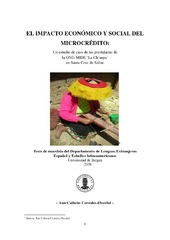| dc.description.abstract | The results of the analysis of the data demonstrate that these women have experimented many changes in their lives since their first contact with MIDE. These changes are classified as material, cognitive, behavioral and relational, considering indicators as income, savings, self-esteem, respect, priority of time in various activities, participation in activities in the village, alcoholism and domestic violence. It is also clear that, to a greater or lesser extent, these changes are observed on an individual level, a family level, a business level, and even on a community level. Hence the question is: Do microcredits constitute the exclusive cause of all these changes? The data suggest another more complex picture, identifying the credit as an important reason alongside with other causes like courses and educational work-shops offered by MIDE, but also by other institutions operating in the village, as well as the presence of the Christian Evangelic Community, the influence of a former president and his govern, and the practice of countryside watchmen' (Rondas Campesinas). However, according to the clients' testimonies, the loans do play an important role in this chain of factors. Relating these findings to the theory presented concerning development, poverty and empowerment, the study concludes that the changes detected prove a positive influence regarding all these concepts. Consequently, the present study confronts the critics against microcredit as an important tool for stimulating development, reducing poverty and generating empowerment. | en_US |
